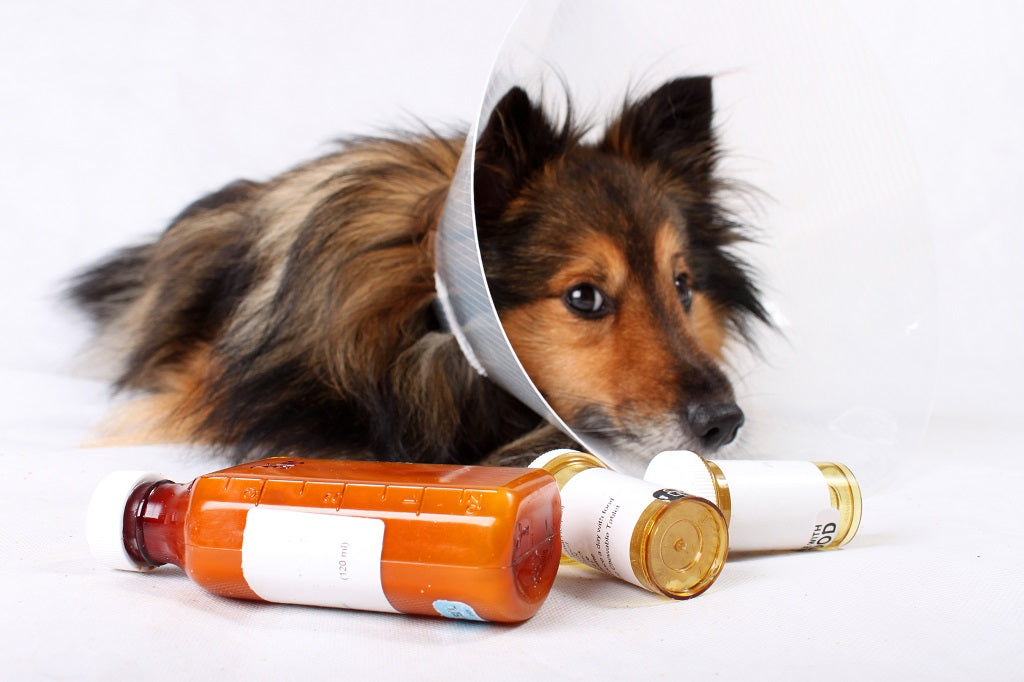
How Expensive is Traditional Dog Cancer Treatment?
Share

Your dog has been diagnosed with cancer. Now what?
You deny it for a while. This can't be real. You get angry. What did your poor dog do to deserve this? Did you do something wrong? Who's to blame? You cry. You'd do anything to make him better. Life has lost its joy.
Finally, you accept the fact that you have to take action by researching cancer treatment for dogs.
You're not alone. Research shows that the cancer rate among large breeds once they reach age 10 is an astounding 50%?
The Food and Drug Administration estimates that dog cancer treatment in the US is a $500 million market. Like most of us, you don't have unlimited money to spend to make your dog well.
Let's look at the cost of dog cancer treatment.
Cost of Dog Cancer Diagnosis
Cancer treatment begins with diagnosis.
Your dog may have all of the symptoms:
- Bleeding from openings in the body
- Abnormal swellings that won't go away
- Open sores
- Weight loss
- Offensive odor
- Loss of appetite
- Difficulty eating
But before your veterinarian can discuss treatment options with you, they will need to determine what kind of cancer she has.
There are 7 primary types of dog cancer:
Melanoma - A highly aggressive cancer found in the mouth, nail bed and on skin
Lymphoma - A cancer of the white blood cells
Osteosarcoma - Bone cancer
Hemangiosarcoma - A very common dog cancer that spreads rapidly through the blood, causing tumors and internal bleeding
Mast Cell Tumors - Mast cells are an important part the immune system in both dogs and humans. This is the most common cancer in dogs.
Bladder Cancer - A cancer that begins in the bladder but quickly spreads elsewhere
Mammary Cancer - Breast cancer.
Diagnosis may include blood tests, basic scans, and biopsies. On average these will run you around $200 plus the cost of the vet visit. In some parts of the country, prices will be higher based upon the cost of living.
If your pooch needs and MRI, that can cost as much as $2,500.
But the vast majority of dog cancers can be diagnosed without an MRI.
Cost of Dog Cancer Surgery
If your vet determines that the cancer can be removed, she will recommend cancer surgery. While your pet is under anesthesia, the vet will cut out the tumor, and then sew your dog up.
The cost for this form of dog cancer treatment starts at around $1500. This includes the cost of hospitalization, anesthesia, nursing care and medicines to help prevent infection so that she can heal. The harder the tumor is to access, the higher the cost will be. You could be looking at as much as $10, 000 in worst case scenario -- if only 1 surgery is needed.
You could be looking at as much as $10, 000 in worst case scenario -- if only 1 surgery is needed.
Your dog's chances of surviving are high with surgery.
Cost of Dog Chemotherapy & Radiation
If the cancer has spread and cannot be removed, then the vet may advise administering chemo or radiation -- probably not both. Both of these are a huge investment of time and money. You will need to come back for multiple treatments over an extended period of time.
Much like a human, after treatments, your dog will feel miserable. He'll need lots of extra love and attention from you and the family. Chemo normally runs around $2000 - $5000 plus the cost of vet visits.
Radiation costs as much as $5000 - 10, 000 plus visits.
Cost of Dog Immunotherapy
Immunotherapy has only been an option for dogs for about 3 years. This treatment uses antibodies to fight the cancer.
Immunotherapy works in two ways:
- The antibody transmits a message to the cancer cell telling it that it's time to "self-destruct". The cell receives the message and dies.
- The antibody "educates" the dog's immune system on how to identify and destroy cancer cells.
Immunotherapy is a lifelong commitment. The dog will receive a booster shot that costs about $1000. After, that the dog must receive a shot every year for the rest of his life to prevent the cancer from returning.
What if You Can't Afford Dog Cancer Treatment
If the price tag is way too high, there are several steps to follow.
Shop around
If you are considering spending this kind of money, check out the vets in your area. Do any come highly recommended? Are any offering the same treatments for less? It's worth it to check them out.
Check out health benefit plans.
This isn't pet insurance -- which you won't be able to get after your pet gets cancer. These are discount plans that may take a little sting out of the cost.
Charities
You can also look into charities and funding campaigns, which may be able to help a little. Most of these charities have very strict guidelines because, unfortunately, they can't help everyone that they want to help.
Alternative Medicine
Lastly, you can learn about effective alternative medicine like Yunnan Baiyao.
What is Yunnan Baiyao?
Yunnan Baiyao is a powdered Chinese medicine.
Just recently made available in the US, Veterinarians are excited about its benefits as a dog cancer treatment.
During the Vietnam War, this drug was very commonly used by the Vietcong to stop bleeding from injury. In fact, it's been used in Chinese medicine for over 200 years.
Despite its proven benefits on humans during the war, many vets in the US were skeptical about this "alternative medicine" until they saw the results.
Yunnan Baiyao doesn't eliminate or cure dog cancer directly. What it does is it reduces the effects of the cancer, so that your dog can live a happier, longer life.
Yunnan Baiyou works by:Slowing the spread of the cancer
1) Slowing the spread of the cancer
2) Reducing internal bleeding.
Especially in the case of Hemangiosarcoma described above, this helps significantly slow the spread of tumors through the blood.
3) Supporting the dog's own immune system so that it can fight the cancer naturally.
4) Reducing inflammation throughout the body.
When the body is inflamed, it pulls energy away from healing the body and makes your dog feel awful.
5) Treating external wounds.
Used externally, it stops bleeding almost instantly. Wounds then heal faster.
6) Improving appetite and increasing energy
Many vets are now recommending this alternative dog cancer treatment as part of a holistic dog cancer treatment. You should consult with your vet before beginning treatment.
It can be used in conjunction with western medicine dog cancer treatments, or as a stand-alone treatment.
To learn more about what some are calling a miracle drug, please check out our site.
